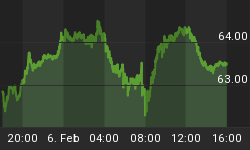
-
While there are rational arguments for the Fed to stand aside during the next bear market, an examination of the do-nothing alternative calls that theory into question.
-
An idle Fed could spark a deflationary spiral, providing an incentive for businesses and consumers to delay purchases as they wait for lower prices.
-
If the stock market and economy begin to falter, politicians in power will scream loudly for Fed intervention.
-
If the Fed allows stocks to enter a prolonged bear market, the fundamental and technical evidence will help guide us to a prudent investment mix.
Lesser Of Two Evils
Many Wall Streeters argue the Fed is tired of doing the heavy lifting as politicians continue to avoid tackling the issues of the day. Another popular argument is the Fed's quantitative easing program failed and they have little desire to bail out the markets and economy when the next crisis arrives. That all sounds logical until you look at the possible ramifications of sitting on the sidelines as asset prices fall.
Deflation Can Curtail Economic Activity
Let's assume when asset prices start to fall in the next bear market, the Fed takes the stance of "we have done all we can do". The Fed has numerous concerns about the do-nothing alternative. From Bloomberg:
When deflation grabs hold, companies and consumers stop spending. It strangles borrowers because their debts get harder to repay -- a menace for countries struggling to exit the worst recession in a generation. In this fairy tale, inflation comes dressed in shining armor as policymakers debate how to create just enough of it to keep deflation at bay. Almost six years since the 2008 financial crisis turned the global economy upside-down, deflation threatens to drag out the turmoil. Most developed economies have failed to recover the momentum needed to stimulate slow-but-steady price increases, which most central bankers consider desirable.
Deflation Is Hard To Stop - Ask Japan
If deflation strangles borrowers and gives companies and consumers an incentive to curtail spending, it is safe to assume central banks would want to quickly stamp out any deflationary threat. That is not an easy task. On December 29, 1989, a massive inflationary bubble began to pop in Japan. As prices dropped, investors with cash sat on their wallets waiting for lower equity prices. The desire to "get out" became much stronger than the desire to "get in" and prices continued to fall. Japan started a process that central bankers have nightmares about - a deflationary spiral. As the chart of the Japanese stock market below shows, a deflationary spiral is very hard to stop once it starts. In fact, 25 years later the Nikkei is nowhere near its 1989 high.

Can you imagine if the S&P 500 peaked this week and did not revisit the high for over 20 years? Japan has been desperately trying to reverse deflationary trends. From Bloomberg:
It's been 22 years since annual inflation in Japan exceeded 2 percent, according to data compiled by Bloomberg. In the last five years of the 1980s, when Japan's gross domestic product climbed from $1.3 trillion to $3 trillion and the Nikkei 225 Stock Average peaked at almost 39,000, the monthly readings for consumer price gains averaged 1.2 percent, the data show. The Nikkei 225 closed today at 15,407.94. "It's difficult to say whether we are really exiting deflation," Mitani said. "Consumer prices are starting to rise, but a large reason for that is based on the weakening yen and rising energy prices. We can't say that looking at recent results, we have really exited deflation."
Governors Prefer Inflation

Assume we asked all the current Fed governors the following hypothetical question:
If you were taking over as Fed chairman, would you rather inherit an economy on the brink of budding inflation or creeping deflation?
The vast majority, if not all, would most likely return an answer of creeping inflation. From Bloomberg:
Central bankers find it easier to beat inflation than deflation. When prices rise too fast, they raise interest rates, then pull back when the economy slows. It's harder to calibrate the right dose of medicine to ward off deflation. Right now, interest rates can't be cut in most large countries because they're already near zero.
Elections and Appointments
Elected and appointed officials in power want to stay in power. Nobody, including Fed Chair Janet Yellen, wants a crisis to occur on their watch. The majority party never wants a weak stock market or weak economy heading into mid-terms or a presidential election. While the Fed is an "independent" body, in the real world they are human beings that face significant political pressure. The pressure to take action will increase exponentially in the early stages of the next crisis.
Investment Implications
Is it possible the Fed says, "we've done all we can do," as stocks kick off the next bear market? Sure, it is. Under any Fed scenario, the fundamentals and technicals will continue to provide guidance. If we monitor the incoming data with a flexible and open mind, there is no need to predict Fed actions. At this point, it is probably fair to say the Fed does not know how they will handle the next crisis, which makes predictions all the more difficult.
While the S&P 500 ETF (SPY) was down 0.28% at 3:00 pm following the Fed statement, bonds (TLT) fared no better with TLT falling 0.94%. The economic and technical data we have in hand continues to side with a growth-oriented allocation. Consequently, we continue to hold SPY and technology stocks (QQQ) as core positions.















